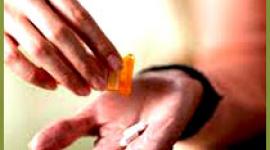Bipolar Disorder Diagnosis and Medical Tests
 Laboratory studies and other medical tests may be helpful in determining the diagnosis of bipolar as well as the extent of any medical problems resulting from the disorder.
Laboratory studies and other medical tests may be helpful in determining the diagnosis of bipolar as well as the extent of any medical problems resulting from the disorder.
Lab Studies:
- Tests for substance and alcohol abuse usually prove necessary initially to exclude drugs and alcohol as causative agents for behavior.
- No specific blood or other laboratory tests are available to aid the mental health professional in diagnosing bipolar disorder.
- Of interest, serum cortisol levels may be elevated, but this is not of diagnostic or clinical value.
- Thyroid studies may help assure the clinician that an altered mood is not secondary to a thyroid disorder.
- The clinician may order serum blood chemistries such as basic metabolic panels and liver function tests to help assess renal and hepatic health before starting or continuing to administer certain medications to help regulate or ameliorate bipolar symptoms.
- Mania and depression both may involve states of malnutrition secondary to the psychiatrically diminished awareness of or ability to maintain one's health and well-being. Thus, a metabolic panel along with, in extreme cases, levels of thiamine, albumin, and prealbumin may help determine the extent of self-neglect and compromised nutritional state.
- Once pharmacotherapy has been implemented, periodic laboratory tests may be required to monitor drug levels and to ensure that no adverse response to the medication is harming renal or hepatic function.
Imaging Studies:
- Neuroimaging modalities are currently not helpful in making the diagnosis of bipolar disorder. Rather, the clinical presentation of symptom clusters as defined in the DSM-IV TRplus family and genetic histories guide the mental health clinician when diagnosing psychiatric conditions.
- Neuroimaging studies of child and adolescent patients with bipolar disorder are few. Magnetic resonance imaging (MRI) studies of children and adolescents with bipolar I disorder have shown enlarged ventricles and an increased number of hyperintensities compared to healthy control subjects. The pathologic and clinical significance of these findings is unknown.
- MRI studies performed by Dasari et al (1999) found that the area of the thalamus is significantly decreased in youth with either bipolar disorder or schizophrenia compared to healthy control subjects; adult studies revealed similar findings. The diagnosis of either bipolar disorder or schizophrenia cannot be made based on this volume difference as revealed by MRI. Nonetheless, reduced thalamic volume is consistent with clinical symptoms of poor attention, difficulty in filtering simultaneous stimuli, and dysregulation of mood—symptoms found in patients with both of these major mental illnesses. Whether a structural or functional deficit within the thalamus may be causal or contributory to the pathophysiology of these mental disorders remains unknown.
Other Tests:
- A baseline electrocardiogram may be needed before starting a psychotropic medication because some are known to alter QT intervals or other cardiac rhythm features.
Sources:
- AACAP Official Action. Practice parameters for the assessment and treatment of children and adolescents with bipolar disorder. J Am Acad Child Adolesc Psychiatry. Jan 1997;36(1):138-57.
- Dasari M, Friedman L, Jesberger J, et al. A magnetic resonance imaging study of thalamic area in adolescent patients with either schizophrenia or bipolar disorder as compared to healthy controls. Psychiatry Res. Oct 11 1999;91(3):155-62.
next: Age of Onset and Gender Issues in Bipolar Disorder
~ bipolar disorder library
~ all bipolar disorder articles
APA Reference
Staff, H.
(2008, November 22). Bipolar Disorder Diagnosis and Medical Tests, HealthyPlace. Retrieved
on 2026, February 27 from https://www.healthyplace.com/bipolar-disorder/articles/bipolar-disorder-diagnosis-and-medical-tests
Last Updated: April 3, 2017



